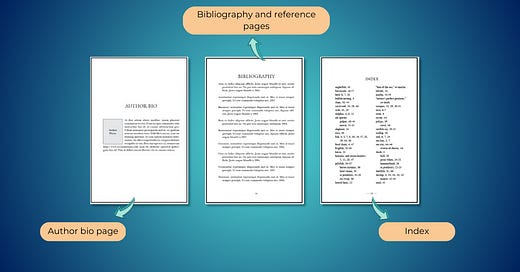Book Essay is a series of narrative/descriptive essays on the parts of a book. From the spine to the back cover, each essay will convey my thoughts (largely subjective) on the components of each part of a book—one essay for a book part. These essays will create the awareness that a book is made of many parts, and show how these parts, put together, make the beauty that a book is. I hope that these musings get us into a conversation in the comments. For me, it is a setup that makes me dig deeper to understand the parts of a book. Therefore, these essays will not be preceded by extensive research on the book part. You can be sure to find errors in factual details. But let me be wrong, this one time, since I would do research afterwards. (But flag down my errors, please!) Worry not, the essays are numbered!
Dear Fellow,
I think fewer people read the Back Matter of a book than those who read the Front Matter. We could do a poll, to conclude by the numbers. But first, let me explain what today’s despatch is about.
In a previous book essay, I shared that a book has three parts. Three parts of a book: Front Matter, Text, and Back Matter. The Front Matter is where the publisher, author, and/or some revered personality prepares you for what’s in the book you want to read. It contains a list of items—frontispiece, half-title page, full title page, copyright page, dedication, acknowledgements, content page, foreword, preface, introduction, etc.—all parts of the book.
The Text is where the real deal is. That is where the essence of the book is. This is where you experience varied emotions depending on the tone, style, theme, genre, and all else that makes the book fall in or out of a particular category. That is where the author did the most work—and maybe not, when compared to the work that is done in the Acknowledgements. The text is where the show happens.
Now, the Back Matter. As the name implies, it is the end of the matter. It is where you find the glossary (a bank of foreign words and acronyms), endnotes (extra details explaining certain statements in the text and pointers to where certain ideas were gotten), references (a list of materials cited in the book’s text), bibliography (a list of materials the author studied to write the book), and appendix (a collage of keywords and phrases in the book and page numbers where they appear in it).

The Back Matter, to me, is where the author demonstrates his generosity. This is where the author gives you, the reader, extra value. There, the author exposes you to much more that isn’t detailed in the text. There, find more treasures. But sadly, like I said at the beginning, few people visit that section.
I talked with a reader of the anthology The Twelfth Despatch: On Writing and Becoming on Wednesday. We talked about the book, including the back matter. She had read one of the appendices, where I attached all the correspondences written during the book’s creation process. She asked when the next book will be out. I smiled. Though she had misinterpreted that section, I was happy that she read it. Then I explained what that section is.
In addition to the correspondence written during its creation, the book contains lecture notes used during the writing fellowship that preceded the book, a schedule of the entire process, and a register of the participants—all these were shared in the book for two reasons. For documentation and so that the process can be reviewed, adapted, and replicated.
The Back Matter of a book—especially the end notes, references, and bibliography—is a bonus that comes with every book.
The Back Matter of a book—especially the end notes, references, and bibliography—is a bonus that comes with every book. It is a gold mine, where more treasures, in addition to the book’s value, are found. Though it is not found in every book, especially fiction books, make the most of it when you find it. An idea may just be waiting there, to be discovered by you.
That said, let’s do a quick poll:
Please, vote. Let’s verify my assumption.
I wish you a restful weekend, good Fellow. Thank you for reading.
Your LetterMan,
Tongjal, W. N.




The very aspect you have emphasised most on. How would we have known the riches in this section if you kept mum?
Thank you for so far for this series!